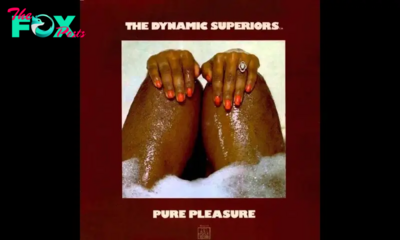Entertainment
أحمد [Ahmed]: Wooden Blues Album Evaluate
On a chilly spring night time in 2022, the jazz quartet أحمد [Ahmed] arrange at one finish of the lengthy, slender warehouse area of Glasgow’s industrial-chic Glue Manufacturing facility. Their muse and namesake Ahmed Abdul-Malik was there in spirit. The setlist consisted of just one music: the late jazz musician’s “Oud Blues,” which runs to about 4 minutes within the authentic 1961 model. By the point أحمد [Ahmed] completed with it, that they had been enjoying for almost an hour.
Wooden Blues is a recording of that phenomenal efficiency—without delay a canopy music, an avant-garde improv session, and a driving, swinging jazz live performance. أحمد [Ahmed] have been honing the self-esteem for a decade: Each present, they select an Abdul-Malik composition and switch it inside out. Pianist Pat Thomas found the little-known bassist and oudist within the Eighties and instantly acknowledged his significance. Born Jonathan Tim, Jr. in Brooklyn to immigrant mother and father, Abdul-Malik modified his identify to claim his Islamic identification and Sudanese lineage. His household was from the Caribbean, not Sudan, however he reached again additional, reclaiming his diasporic African heritage. As a bandleader, Abdul-Malik included Arabic devices—qanun, darbuka, a violin tuned to fourths and fifths—into his ensembles. His late ’50s and early ’60s albums like Jazz Sahara and East Meets West ushered within the new type of modal jazz alongside landmark recordings by Miles Davis and John Coltrane.
Thomas needed to revive Abdul-Malik’s music, to show a footnote right into a headline. Saxophonist Seymour Wright shared his curiosity and joined Thomas’s trio اسم [ISM], with bassist Joel Grip and drummer Antonin Gerbal, to kind أحمد [Ahmed]. Collectively, they’re one thing of a supergroup, every participant a star in a distinct constellation of the European improvised music scene. They solely carry out reside, with no observe or advance planning. However from their separate cities—Thomas and Wright in London, Grip in Berlin, Gerbal in Paris—they’re at all times enthusiastic about Abdul-Malik. After they play one among his songs, all that pondering comes out in a torrent of sound.
Wooden Blues is without delay thrillingly violent and fervently trustworthy in its transformations of Abdul-Malik’s materials, altering the unique past recognition but preserving its spirit alive. The recording begins with the viewers chattering as Grip performs the strolling bassline of “Oud Blues.” Thomas provides melodic piano thrives and Gerbal lays down a shuffling beat. Wright helps with quick percussive clicks from his saxophone, then extends these clicks into bursts, buying and selling licks with Thomas, who bangs on the keys with growing pressure. There’s a shift within the room because the viewers goes quiet. Piano and sax merge right into a single pummeling assault. Gerbal retains time with a gradual tom-tom pulse, and Grip carries the melody by the fray. The second can’t final lengthy, and shortly the band is propelled by a frantic rhythm, Thomas pounding the piano, Wright blowing with scary energy, the gang now shouting, screaming, dancing.
-

 Entertainment3h ago
Entertainment3h agoGet to Know Bluesky, the New X Alternative with 18 Million Active Users
-

 Entertainment3h ago
Entertainment3h agoChuck Woolery, Smooth-Talking Host of Love Connection and Wheel of Fortune, Dies at 83
-

 Entertainment4h ago
Entertainment4h agoBardavon Announces New Executive Director
-

 Entertainment9h ago
Entertainment9h agoThe Real Story of Jean Purdy, Whose Work Developing IVF Is Portrayed in Netflix’s Joy
-

 Entertainment9h ago
Entertainment9h agoDanielle Deadwyler Is The Piano Lesson‘s Guiding Light
-

 Entertainment10h ago
Entertainment10h agoDonna Kelce’s ‘Holiday Touchdown’ Cameo Includes Sweet Easter Egg to Son Travis: ‘Love You Mommy’
-

 Entertainment14h ago
Entertainment14h agoHow Gladiator II Connects to the Original Gladiator
-

 Entertainment19h ago
Entertainment19h ago3 Completely different Kinds of TV Appearing Roles



















